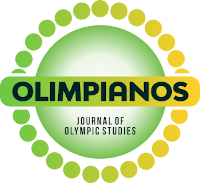Brazilian women in Olympic combat sports: a discussion through life stories
DOI:
https://doi.org/10.30937/2526-6314.v4.id108Keywords:
martial arts, combat sports, gender, life stories, narrativesAbstract
With the rise of the Olympic Games (OG) in the Modern Era, there could be seen an increasing opportunity to promote encounters between countries, encouraged by sports dispute. In this process, the participation of Brazilian women has been recognized and reconfigured, while facing a double challenge: to be a sportsperson in Brazil, as a woman. This study aims to understand how female participation in Olympic Combat Sports (OCS) – Judo, Boxing, Olympic Fighting, Fencing, Taekwondo and Karate) occurred, notably from the life stories of the athletes. As a methodological procedure, this research was carried out based on the reports in Atletas Olímpicos Brasileiros (Brazilian Olympic Athletes) by Katia Rubio, adding some narratives brought in through other studies that addressed the theme of women in the OCS. Throughout the analysis we note similarities and differences among the modalities. All of them converge on the important challenges that women have taken in the process of conquering spaces in a predominantly masculine field, like sports in general or in the Martial Arts & Combat Sports (MA&CS) domain. The discussion corroborate most of the findings in the literature, however research is needed to focus on the pre-reflexive and embodied dimension of their experiences or in the daily life of their practices, which would allow us to point out if these differences can be confirmed beyond their discourses. These aspects also highlight the need for new research at gender issues in its transcultural, racial and transsexuality nuances, as well as in other MA&CS. Further studies on women in sports are expected, especially those done by women themselves and/or considering their reports, narratives and experiences, seeking to break a historical process in which both science and sport are made by men, and women have played the role of object or spectators, and rarely of an active subject.
Downloads
Downloads
Published
Issue
Section
License
The authors authorize others to copy and redistribute the material in any medium or format. Remix, transform, and create from the material. You may not use the material for commercial purposes.






